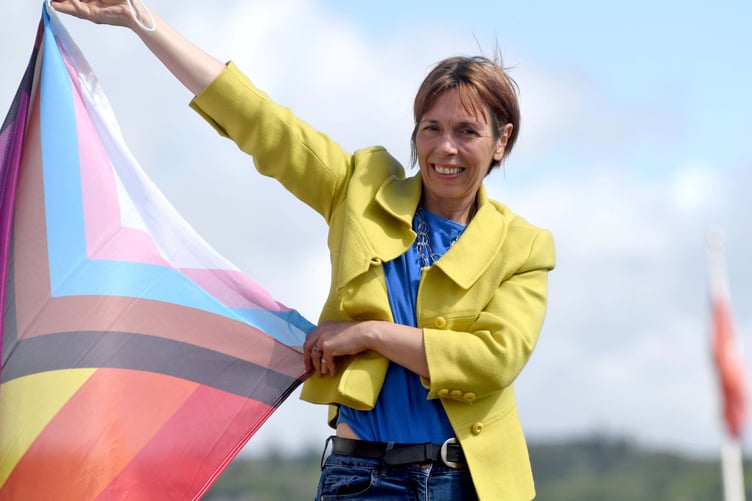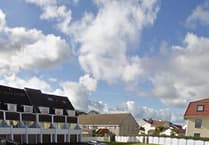We’re still on a journey but I think the journey is now being spoken about, that’s the difference.
‘Whereas before it was hidden until something went wrong and then it was a reactive response to it, now people are thinking about it in a proactive way, how to make people feel included and happy at work.’
That’s Dawn Kinnish talking about business’ evolving relationship with the ideal of equality.
And not just an ideal: equality is something that is now enshrined in law, how an organisation treats both its staff and its customers.
It’s become an issue that is high on the agenda of most businesses but that does not mean to say that they always know, for example, what changes they need to implement to allow access for people with a disability. Or how to encourage a workplace culture of diversity and inclusion.
And that is where Dawn comes in, because, when it comes to equality in the Isle of Man, she is the go-to person. It’s a subject she knows inside out and last year she opened a consultancy business to advise organisations and pass on some of that knowledge.
Dawn’s first brush with equality was when she did her law degree: ‘My dissertation was around discrimination in the workplace,’ she recalls.
After moving to the Isle of Man in 1997 she worked for a corporate service provider and then an accountancy practice before finishing her articles with Dickinson Cruikshank (now Appleby), but discrimination law wasn’t in the form that it is today so there wasn’t really an opportunity for her to practise in that area.
After taking a career break to have her four children, Dawn began teaching law at UCM for a degree programme run by the University of Chester which contained elements of English law including the Equality Act of 2010.
Whereas before there had been some sex and race discrimination law, this Act had signalled the start of businesses being obliged to take a full range of equality issues seriously.
It also reignited Dawn’s interest in the subject. She says: ‘I immersed myself in it, was passionate about it and used to complain to the students that we didn’t have the equivalent equality legislation on the Isle of Man. I knew that a Bill was coming through the branches here so I used to ring the Cabinet Office and find out what was going on.’
The Bill finally went through in 2017 and the following year the Cabinet Office advertised for an Equality Advisor to implement the legislation. They were looking for someone, not just with the necessary legislative knowledge but also somebody who could do training and presentations, and develop guidelines.
Dawn recalls: ‘When I read the advert I felt that it was made for me so I applied and got the post. I absolutely loved it but I always knew, because it was a short term contract, that I had to think about what I was going to do at the end of it. Because I’d immersed myself in the legislation, I knew it inside out. I’d worked broadly across the Isle of Man, everybody knew me for equality, so in April last year I set up a consultancy business and, through having that network of contacts, it launched me into an area on the Isle of Man that is developing rapidly.
‘The general diversity, equality and inclusion of gender is at the forefront of a lot of businesses’ minds because they recognise the need to attract talent to the Isle of Man.
‘That means they need to be diverse in the way they approach that but also it’s sending that inclusive message to the staff so that staff know that they can bring themselves to work and that they can be themselves at work.
‘And I think more and more young people are asking questions about what an organisation’s diversity inclusion agenda is, where does that fit in their organisation: they’re not scared to ask that question.
‘In terms of timing it’s been fantastic for the launch of my business.’
Despite her passion for the subject, Dawn is not there to preach: very often it is a matter of simple, practical advice.
She can, for example, carry out an access audit on a business premises, looking at the changes that need to be made to allow someone with a disability to access that company’s services and what grants are available to help.
It might be small changes, such as signage, or it make be bigger changes to the structure of a building.
Armed with that knowledge the business can then prioritise those changes and plan how and when to carry them out.
‘And that’s always a good thing to do, in the event of a challenge,’ advises Dawn, ‘so, if somebody says: “I’m not able to access your service”, you can say: “Well actually, we’ve reviewed our premises and this is the plan that we’ve got: this is when we can afford to do it and how we’re going to do it”.’
When it comes to more abstract issues, such as an organisation’s culture and how it portrays itself, Dawn might also review its website, to see that the message being delivered is perceived by its audience as being inclusive.
As Dawn points out, setting out to make your business appear as diverse and inclusive as possible isn’t just about being nice to people: ‘At the end of the day it’s about maximising your customer base: it’s about improving your bottom line.’
Her passion for equality takes her outside of her business too: she is a director of Isle of Pride, the charity which aims to serve the island’s LGBTQ+ community and ‘promote equality, diversity and inclusion for all, regardless of gender, sexuality, colour, creed or ability’.
The charity held its first Pride Festival in the Villa Marina Gardens, in June last year, a free event with lots of family activities which 8,500 people attended.
This year, the Pride Festival is on August 13 and begins with an ‘open’ parade, which anyone can join, setting off from the Sea Terminal at 11.45am to march along the promenade to the bottom of Broadway.
When it comes to LGBGT issues, Dawn says: ‘I think the Isle of Man has come a long way in a short time. This year is the 30th anniversary since the decriminalisation of homosexual acts so we are celebrating that in the Pride parade but of course we are 25 years behind the UK in that.
‘We’re a small charity at the moment and we want to grow the charity to be able to deliver more projects and get people out there who can share their lived experience so people can really start to understand what it’s like to be living through the lens of that person.
‘That’s the important thing with equality: it’s understanding somebody else’s life through their lens. I think that enables a level of empathy then.’
I suggest that the whole subject of equality, especially when it comes to transgender issues, has become a bit of a minefield that has seen many people worrying about inadvertently causing offence.
Dawn agrees: ‘Fear is a big problem but training can overcome that fear and I think that’s where training is important for organisations: it’s about learning what the terminology is.
‘At the end of the day it comes down to respecting another person and accepting them for the way that they want to live their lives.’



.jpeg?width=209&height=140&crop=209:145,smart&quality=75)
